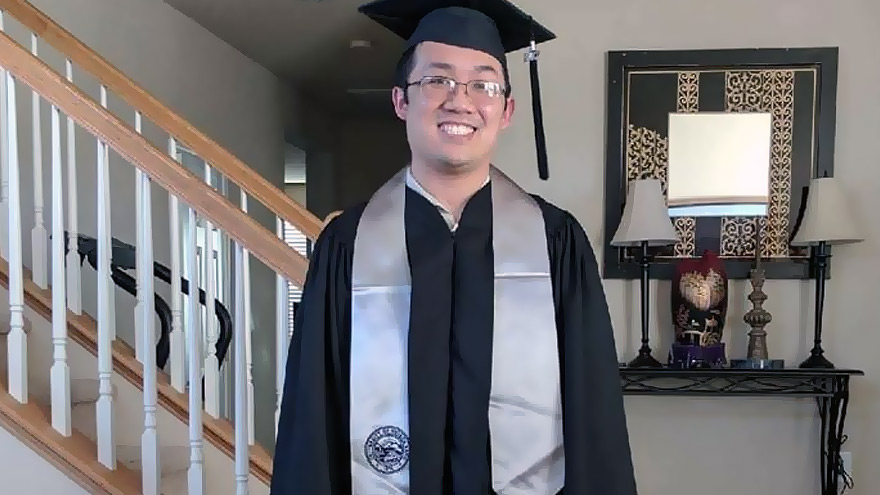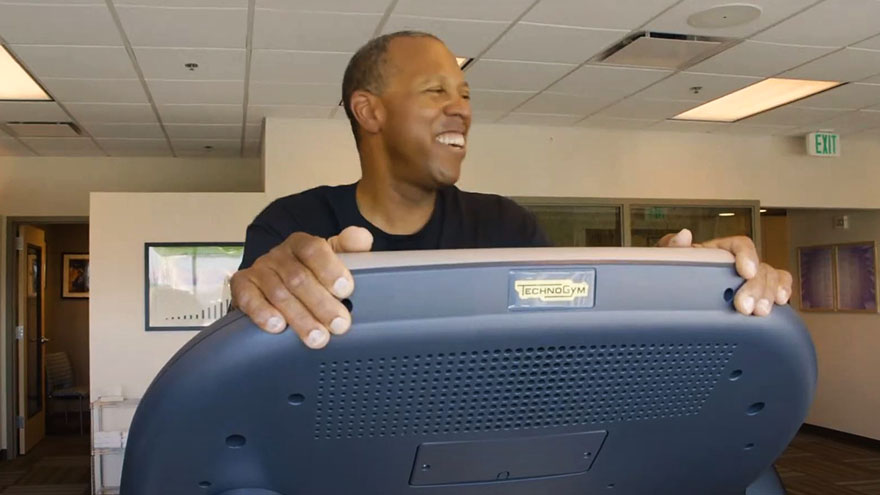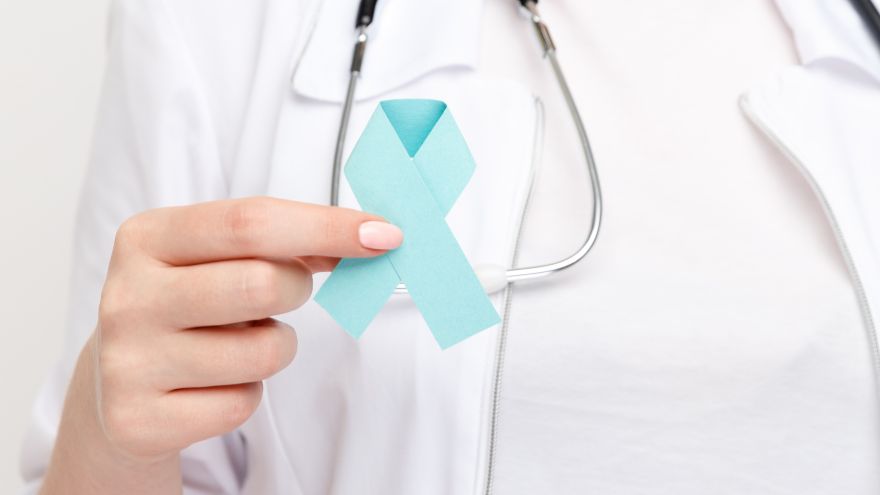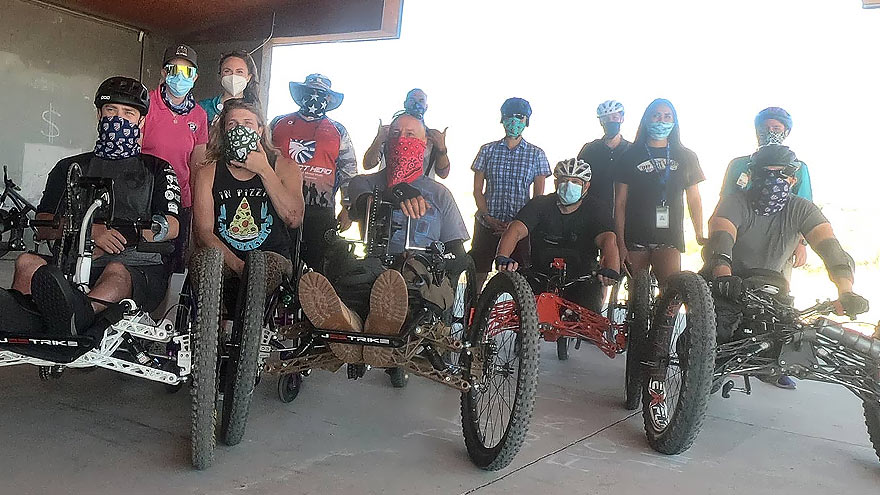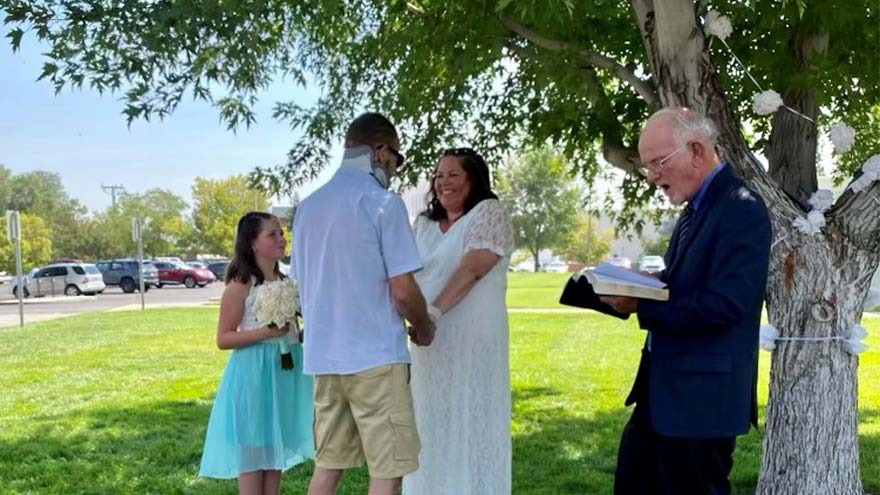Search
-
Perseverance and Physical Therapy Help UNR Student Walk Again
University of Nevada, Reno student Khoa Le was paralyzed in 2010 after a longboarding accident. Through physical therapy, a positive attitude and sheer will, Le is walking again. This weekend, Le will walk across the commencement stage to accept his college diploma. “Walking around on my own power is just the greatest feeling,” says Khoa Le, a senior at the University of Nevada, Reno. Just after finishing summer school at the university in July 2010, his whole life changed within seconds after stepping on a longboard skateboard for the first time. He lost control of the board and hit the curb, causing paralysis on the left side of his body. His journey to recovery began at Renown Health Physical Therapy & Rehab. His physical therapist, Dina Barry, says he never complained once in four years. “I started seeing Khoa in April 2011, and we worked for four years together,” says Barry, a lead physical therapist at Renown. “Everything I’ve ever asked him to do, he does. Le is a hard worker, is continuously optimistic and smiling, and I think that is why he’s accomplished what he has.” Le plans to pursue a career as an information systems manager.
Read More About Perseverance and Physical Therapy Help UNR Student Walk Again
-
Going the Distance to Get Heart Healthy
After having a heart attack, a Mammoth resident travels to Reno to complete rehab. He’s already lost 15 pounds and gained a healthier outlook on life. Eric Smith travels from his home in Mammoth Lakes, Calif., to Reno twice a week to participate in Renown Health’s Healthy Heart Program. “Living in Mammoth, it’s a three hour drive for me up here. Well, it’s my life or it’s a drive,” says Healthy Heart Program participant Eric Smith. The Mammoth Lakes, Calif., resident travels to Reno twice a week to participate in the 72-session program. which includes heart-healthy classes, exercise sessions and cooking demonstrations. “The cardiac rehab program here is excellent,” Smith says. “It is the only program that I am aware of that combines nutrition and exercise together. What’s the point of exercising to get your heart strong if you are still eating poorly and not educating yourself on that?” Smith’s heart issues began when he was 46-years-old. He received an angioplasty, which is a stent to hold a coronary artery open. Two years later, Smith had a heart attack and was flown to Renown Regional Medical Center for emergency bypass surgery on four arteries to allow blood to flow to his heart more freely. An avid skier, ski racing coach and tile setter, Smith admits that it is sometimes difficult to eat right when you’re on the go in a tourist town. Since starting the cardiac rehab program, Smith says he is feeling more optimistic on making lasting lifestyle changes after meeting other people who are going through the same challenges, like food cravings and trying to get stronger. “The big thing is getting educated on food,” says Smith, who has swapped out heavy breakfasts for whole grains and fruit, and steak dinners for baked fish. In just a few months of starting the program, Smith lost 15 pounds. He looks forward to passing along what he’s learned to his friends. “Everybody benefits from this program, especially if you have experienced a heart attack,” Smith says. “But if you don’t have those issues, you can still get the benefits from eating healthier.”
-
Powerlifting through MS Diagnosis
When Tabitha Cox received a diagnosis of multiple sclerosis (MS), she was in shock, denial and felt that she was too strong for something like this to be happening to her. As the disease progressed, Tabitha realized she needed to do what she could to stay as healthy as possible. “I heard, ‘You have a quarter-size lesion on your brain,'” recalls Tabitha Cox. “At that moment, that was literally all I heard come out of her mouth.” Tabitha’s official diagnosis was multiple sclerosis (MS), an unpredictable, often disabling disease of the central nervous system that slowly debilitated her mom. “I was numb,” says Tabitha. After her diagnosis, Tabitha went on with her life as if the disease was nothing more than a doctor’s diagnosis. However two years later, Tabitha realized something wasn’t right and sought care at Renown Institute for Neurosciences – Brain and Nerve Care. Her form of MS was aggressive, and her doctor recommended treatment right away.
-
Dry Weather and Your Health – What to Know
Dry weather – as northern Nevadans we know it well. Of course this doesn’t mean we’re not affected by its health impact whether you’re new to the area or are a native. Stephanie Stutz, DO, a Renown Medical Group doctor specializing in family medicine, explains how to live comfortably in the high desert. Have you noticed dry skin, itchy eyes or more bloody noses? If you call northern Nevada home, you’re probably no stranger to these problems. “We get a lot of questions from people wanting to know, ‘what can I do to prevent things from happening from the dry weather?’” says Dr. Stutz. “We do have a dry climate, and obviously in the summertime you notice it more than in the winter, so we look at things like dry skin, dry eyes and dry nose.” It generally takes about two weeks to become used to the change in climate. Dry Weather Health Tips Fortunately, there are some easy things you can do to reduce your discomfort in dry weather. Dry skin. “If you have dry skin, use a lotion without perfumes so it won’t increase the potential for drying your skin out,” recommends Dr. Stutz. For example, one home remedy for extremely dry skin (or for those with thinner skin) is cocoa butter. “It’s thicker so it goes under the skin and takes more time to absorb. As a result, you get a much more long-lasting effect.” Dr. Stutz adds. “You can also add lavender essential oil to your cocoa butter to help you sleep at night.” Dry and itchy eyes. “Use eye drops on a regular basis and keep them with you. I recommend people have a couple of bottles – one at home and one in their bag,” Dr. Stutz suggests. Dry nose. “Overall one of the best things to use is a simple nasal wash,” she says. “You can get it over the counter; it’s a saline nasal wash. Use it a couple of times each day and it can be extremely helpful. In particular, gets up into the sinuses and clears them of any pollen or residue in there.” Dry Weather Nosebleed Advice In our dry climate, you may also notice more allergies and nosebleeds. Dr. Stutz cautions, “Surely the dry air can make your allergies much worse. It can create much more irritation, pain and pressure, particularly in the nose and sinuses.” Again, Dr. Stutz recommends using a nasal wash to remove discomfort. Using a nasal wash two to three times a day can also help prevent nosebleeds. “And if you’re someone who has severe or chronic nosebleeds, you can put a little bit of Vaseline along the inside of your nose to create a moisture barrier”. Dry Weather Medication Advice In addition to allergy and nosebleed sufferers, people on certain medications may be at greater risk for symptoms in our dry climate. “The medications you are on can make you much more susceptible to drying out and becoming slightly dehydrated,” Dr. Stutz warns. For this reason discuss all of your medications with your doctor. Specifically, see if you can time them throughout the day or look at changing the dosage. Should I Get a Humidifier? Given our year-round dry weather, you may want to purchase a humidifier to help ease your symptoms. But there are some things you should know first. “You have to be careful with humidifiers as there are pros and cons,” states Dr. Stutz. “The small tabletop humidifiers are not beneficial. You need to get one covering a huge amount of square footage and holding approximately 10 to 30 gallons of water to help your home. On the negative side, if you’re not maintaining it on a regular basis, it will hold on to mold and other allergens. So the next time you turn it on, you’re actually putting that back into the air.” Do I Need to Go to the Doctor? To be sure, it’s important to know yourself and your family. If this is something you experience each year, you can try over-the-counter medications. “But remember, there’s always the caution if you’re on prescription medications,” Dr. Stutz explains. “If you are on chronic prescriptions, come in to get evaluated just to make sure you’re not using anything which interferes with your medications.” Not Just a Summer Problem As the temperatures drop, remember this isn’t just a seasonal issue here in the Reno-Tahoe area. During the winter months, our dry climate combined with cold temperatures and heaters can still cause dry skin, aggravated sinuses and even itchy eyes. So use these helpful dry weather tips all year. Comprehensive Primary Care Renown Medical Group primary care physicians provide comprehensive primary care by appointment. Doctors coordinate each patient’s medical care including checkups, immunizations, referrals to specialists, lab work, X-ray & imaging and hospital admissions. Find a Doctor
-
What is Disordered Drinking?
An alcohol problem can affect anyone at any age. Many factors, including job stress, genetics or depression, may contribute to the start of disordered drinking. Drinking alcohol exists on a continuum. For example, if someone feels down in the dumps for some time, it doesn’t mean they are clinically depressed. So if someone goes through a period with above-normal alcohol consumption, it doesn’t necessarily mean they abuse alcohol. Although “alcoholic” and “alcoholism” are common, they are not clinical descriptions. Alcohol use disorder is the preferred term. Symptoms are often mild but can be the start of a more significant problem. According to the National Institutes of Health (NIH), over 16 million adults live with alcohol use disorder. Symptoms of Alcohol Use Disorder Do you recognize any of the following symptoms in yourself or someone you know? Drinking more or longer than intended Trying to cut down or stop drinking but not able to Having to drink more than you once did to get the same feeling Being annoyed when family members discuss your drinking Regretting your behavior while you were drinking
-
Preventing Spinal Cord Injuries: What to Know
If you're not taking safety precautions during mountain sports, you could be at risk for a spinal cord injury. Dr. Benjamin Pence of Renown Rehabilitation Hospital explains the best way to prevent this serious injury. Mountain sports are a big part of the winter season here in our area, but if you’re not practicing all the proper safety techniques, you could end up with a serious spinal cord injury. Benjamin Pence, MD, Renown Rehabilitation Hospital, is here to offer tips to prevent this serious injury while you’re out enjoying what the Truckee Meadows has to offer. What is the spinal cord? The spine stretches from the base of your skull to the coccyx (commonly referred to as the tailbone). Your spine is made up of 24 vertebrae—seven cervical, which are in your neck, 12 thoracic, which are in your chest, and five lumbar, which are in your lower back. There are ligaments and muscles attached to each vertebra. These facilitate back movement and protect the bones from damage. There is cartilage between each vertebra which acts as a shock absorber for your spine. Finally, the spinal cord is a long, thin, tubular bundle of the nervous tissue and support cells that is enclosed in the spinal canal and send signals from the brain to everything from your arm and leg muscles to bowel and bladder function. The brain and spinal cord together make up the central nervous system.
Read More About Preventing Spinal Cord Injuries: What to Know
-
Learn How to Manage Lymphedema
Katherine Bunker, Physical Therapist and Certified Lymphedema Therapist (PT, DPT, CLT) at Renown, discusses how patients can manage lymphedema with changes to daily routines along with diet and exercise. Lymphedema is a condition that affects millions of people around the world. It is a chronic and progressive disorder that results in swelling of the arms, legs, or other parts of the body due to an accumulation of lymph fluid. Lymphedema can occur because of cancer treatments, surgery, or other medical conditions. Managing Lymphedema Treatments to help reduce symptoms such as pain, swelling and discomfort associated with lymphedema can include compression garments, exercise, skin care, manual lymphatic drainage and pneumatic compression. The goal is to avoid triggering the onset of lymphedema. Lymphedema can present itself immediately after surgery or radiation. It can appear months later or even years later. There are many factors that influence the development of lymphedema which is why prevention is so important. If you have had injury or disruption to your lymphatic system, then: Avoid injuries to the skin near the affected area. For example: wearing gloves during gardening, using bug spray to ward off mosquitos, covering your limbs while playing with pets, keeping nails clean and avoiding cutting too close to cuticle, utilizing electric razors at the armpit (instead of a traditional razor)., Avoid blood pressure readings to the affected limb or request blood pressure to be taken manually, not by a machine. Avoid heat like saunas, hot tubs, sunburns, hot packs, and even massages. Avoid tight jewelry like rings or bracelets, which can be too tight.
-
Why are Annual Exams & Routine Screenings Important?
March is Colorectal Cancer Awareness Month, and we want you to receive the best preventative care possible. Early detection can help prevent serious illness, yet many people still choose to skip their annual exams and routine screenings. Bonnie Ferrara, MD, MPH, Section Chief for Primary Care at Renown Medical Group, further explains the importance of this simple, easy way to stay healthy. Why are annual exams so important? The benefits of early detection and prevention to save lives and reduce the impacts of disease have been proven. These exams are the perfect opportunity to get your health questions answered. “This is your chance to sit down with your provider and talk about your overall health and your family’s health history as well as your concerns for the future,” says Bonnie Ferrara, M.D., family medicine. “It’s the opportunity for your provider to talk with you about your lifestyle, tobacco use, exercise and alcohol use, all of which make a difference in your future longevity.” The annual wellness exam is also an ideal time for most adult patients to discuss health screenings. In addition, these visits are the perfect time to address issues that may not directly relate to a particular medical problem or immediate illness. A good rule of thumb is to schedule these appointments around your birthday each year to make sure you and your provider are both updated on your care. Why would you need an annual exam if you aren’t feeling sick? According to Dr. Ferrara, seeing your care provider when you aren’t sick is one of the best times. “It is better if you try to arrange this visit when you are not feeling ill,” she says. “It is an opportunity to talk about wellness. Not only how to contribute to your wellness but also the changes that you can make that will make huge dividends in the future for your wellness. In addition, it allows us to do some education about what to expect in the coming years as far as your health and lifestyle changes.” What can you expect at an annual exam? Annual exams usually check your: History – lifestyle behaviors, health concerns, vaccination status, family medical history Vitals – blood pressure, heart rate, respiration rate and temperature General appearance – your care provider can find out a lot about you just by watching and talking to you Dr. Ferrara adds, “If this is a Medicare annual wellness exam, it is an opportunity to talk to your provider about depression and dementia as well as be tested for those.” You can also leverage your annual exam to speak to your provider about managing your chronic health problems. "As a provider, these visits give us the opportunity to hear how the medications and lifestyle changes we have recommended are working and if you are having problems with these, we have the opportunity to make suggestions of how to do things better for the future," Dr. Ferrara.
Read More About Why are Annual Exams & Routine Screenings Important?
-
How a New Recreation Therapy Program Creates Valuable Bonds
The Recreation Therapy Alumni Program is a new addition to Renown Rehabilitation Hospital’s current programs. After daily hospital physical therapy ends, it is an opportunity for other adventures. Shaun Stewart, CTRS (Ceritified Therapeutic Recreation Specialist), tells us about the new Renown Alumni Recreation Therapy Program, its partnership with the City of Reno and upcoming events. It’s no secret that being active and social supports a satisfying, happy life. With this in mind, the Renown Alumni Recreation Therapy Program reinforces this idea. Its goal is to help patients experience the energy, teamwork and commitment that sports and recreation provide beyond the hospital walls. “We are happy to partner with the City of Reno’s adaptive and inclusion programming to create an active community of adaptive sports participants. There are many options for outdoor recreation in our area. This program looks to share these opportunities with those with a traumatic spinal cord injury,” says Shaun. April Wolfe, CTRS, with the City of Reno adds, “The program’s main objective is to empower individuals living with spinal cord injury to live and recreate independently in the community. We also want them to enjoy the activities, improving their emotional and physical well-being by taking part in the Renown Alumni Recreation Therapy program.” First Successful Therapy Event On Aug. 27, 2020, the recreation therapy program’s first event was an introduction to adaptive mountain biking. Eight participants enjoyed a morning of adaptive biking thanks to a grant in partnership with the City of Reno. “Getting back to an active leisure lifestyle following injury can increase your quality of life both socially and physically,” explains Shaun. “It was great to be outside with people of all abilities enjoying the beautiful Nevada sunshine.” We encourage patients of all abilities to develop active skills, make lasting friendships and, of course, have a blast. Certainly any activity is possible with adaptive equipment and a motivated attitude. Future Recreation Therapy Events Below are the details for the next event. Event: Introduction to Wheelchair Rugby Learn the rules of the sport and play with local athletes. When: Sunday, Nov. 1, from 2 – 5 p.m. Where: Evelyn Mount Northeast Community Center, 1301 Valley Rd., Reno, NV 89512 Cost: Free RSVP: Shaun.Stewart@renown.org or 775-982-3612 by Tuesday, October 26, 2020 This event has a 10 participant limit, following six feet distancing guidelines. Please bring a mask to wear. In particular, this will be a learning event and no scrimmages will occur Rugby wheelchairs will be provided. Please RSVP, to ensure the reservation of the appropriate equipment. In case you cannot attend this event, please look for upcoming events which will include adaptive archery, skiing and scuba diving. Renown Rehabilitation Hospital | 775-982-3500 Renown Rehabilitation Hospital is the region’s only hospital with certification by the Commission on Accreditation of Rehabilitation Facilities (CARF). It is certified for: Comprehensive Integrated Inpatient Rehabilitation Program Stroke Specialty Program Medical Rehabilitation Case Management Take a Virtual Tour
Read More About How a New Recreation Therapy Program Creates Valuable Bonds
-
Renown Neuro Diagnostic Laboratory Nationally Recognized
Earning its third five-year accreditation, Renown’s neuro-diagnostic lab remains Nevada’s only accredited ABRET facility. The Renown Institute for Neurosciences is pleased to announce that the neuro-diagnostic lab at Renown Regional Medical Center has been re-accredited by the American Board of Registration of Electroencephalographic and Evoked Potential Technologists (ABRET). ABRET’s lab accreditation process evaluates technical standards, the quality of a laboratory’s output, and lab management. “Renown Health is a leader and a destination for health in treating neurological disorders and advancing innovations in neurology. The specialists at the Renown Institute for Neurosciences provide comprehensive brain, nerve and surgical support along with a full range of diagnostic and additional procedures and a disease-specific, patient-focused approach to care,” says Tony Slonim, MD, DrPH, FACHE, President and CEO, Renown Health. “This prestigious honor from ABRET means Renown’s Electroencephalogram (EEG) Laboratory has met strict standards and is recognized as a place where patients and physicians can confidently receive quality diagnostics.” “In addition to re-accreditation from ABRET, the Institute for Neurosciences has earned a Gold Seal of Approval by the Joint Commission and offers advanced treatment options including t-PA (Tissue Plasminogen Activator) and biplane angiography. The Level III accredited Epilepsy laboratory implements some of the newest treatments available,” said Renown’s Chief Medical Officer, Paul Sierzenski, MD, MSHQS, CPE, FACEP. “Renown patients also have access to the most promising new therapies through national clinical trials, which have been shown to significantly improve patients’ health and well-being.” “I am proud to recognize our dedicated team of caregivers for their continued passion and excellence in maintaining the highest standards in patient care,” said Renown Institute for Neurosciences’ Division Chief, Dr. Rolando Ania. “It is all thanks to their tremendous efforts that we remain the only ABRET accredited laboratory, as well as the only nationally accredited epilepsy center (NAEC Level III), in the state of Nevada.” Using a collaborative approach, specialists at the Renown Institute for Neurosciences use leading-edge diagnostic tools to identify neurological conditions and treat patients with the most effective techniques available. What is a Neuro-diagnostic Lab? A neuro-diagnostic lab allows care teams the technology to evaluate how a patient’s peripheral, autonomic, and central nervous systems function, and aid in diagnosing and treating conditions such as epilepsy, multiple sclerosis, Parkinson’s disease, stroke, and other diseases of the nervous system. What is an Electroencephalogram (EEG)? An Electroencephalogram (EEG) is a test that measures and records the electrical activity of the brain. During the test, special sensors called electrodes are attached to the patient’s head and hooked by wires to a computer. The computer then records the brain’s electrical activity on the screen. Using a collaborative approach, specialists at the Renown Institute for Neurosciences use leading-edge diagnostic tools to identify neurological conditions and treat patients with the most effective techniques available. Renown Health hospitals are ranked as Nevada’s top hospitals by U.S. News & World Report.
Read More About Renown Neuro Diagnostic Laboratory Nationally Recognized
-
Keeping Your Brain Healthy, No Matter Your Age
It’s true there is no cure for dementia, yet studies suggest your life choices today can reduce brain decline in the future. How important is diet to brain health? Food is the foundation of your body. Fats, carbs and protein provide the energy for your cells and metabolism. So the quality and amount of food you eat directly affects your brain. Specifically, researchers are paying special attention to the link a high sugar diet and/ or an unhealthy fat diet may have on your brain. Your brain on sugar According to the Alzheimer’s Association, when too much sugar is in the bloodstream for long periods of time, it can damage the brain cells. Many people with diabetes may develop brain abnormalities, and these changes may increase chances of dementia — research is still being done to understand this connection. Many U.S. adults have prediabetes with blood sugar higher than normal. Insulin resistance often leads to diabetes. Insulin resistance has been linked to metabolic syndrome, which is a precursor for cardiovascular and cerebrovascular disease (heart attack, stroke). Some signs of metabolic syndrome include: Large waist size (40 inches or more for men, 35 inches and up for women) Low HDL (good) cholesterol level Higher than normal blood pressure — 130/85 and above Current research suggests too much sugar in the blood causes inflammation, which can damage brain cells. High carbohydrate foods, such as sweetened beverages, chips, white rice, white potatoes, bagels, cereals and desserts, have been shown to raise blood sugar. Although anyone can get diabetes, Hispanic Americans and African Americans are at greater risk.
Read More About Keeping Your Brain Healthy, No Matter Your Age
-
Love Endures - A Remarkable Recovery Leads to a New Future
It’s true that a road trip can change your life, and it did for Sergeant Brandon Ott, just not in the way he was expecting. For nine years, Brandon worked alongside his friend, Denton Tipler, at the police department in Florence, Oregon. To break the monotony of the COVID-19 lockdown, they planned a ‘guy’s trip’ - a pandemic safe, motorcycle adventure traveling through Idaho and Washington. On the morning of July 22, 2020, they set out on their journey. But by 8 p.m., they ran into rough weather - with wind, poor visibility and heavy rain as they rode into Nevada. Four miles from their destination, on a desolate stretch of Highway 140, a gust of wind hit Brandon. Denton watched in disbelief as his friend bounced, tumbled and ultimately came to a stop after sliding over 100 yards. He flagged down the next vehicle, a semi-truck, and the driver did traffic control while another passerby drove to get cell service and call 911. A Distressing Call About 10 p.m. the same night, Angie Brog, Brandon’s partner, picked up her phone at the Florence police station. A Nevada highway patrolman let her know Brandon was in a motorcycle accident and had been taken to a hospital in Winnemucca, NV. From there he took a life flight to Renown Regional Medical Center. Angie immediately called Brandon’s parents and told Addison, their 9-year-old daughter, the news. They quickly packed their bags and drove to Nevada. On the drive to Reno, an ER doctor called Angie to give her Brandon’s status, “I can’t thank him enough. I was so worried. He even gave me his personal cell phone number.” Upon arrival, she ran to see Brandon in the trauma ICU. “His face was shattered, he had a collapsed lung, a tube was down his throat and something was in his head to relieve pressure from his swelling brain,” she remembers. “He was not expected to live.” While Brandon was in a coma for three days, Angie was by his side, trying to come to grips with a new normal. “The doctors did not sugarcoat it,” she recalls. “They told me to prepare myself if he pulled through.” It was a rough week in the ICU with Brandon heavily sedated, so he could heal. From there he was transferred to the neurology floor, where he slowly improved. While there, his daughter Addison got to see him for the first time. Angie says, “When Addison saw her daddy for the very first time, she was relieved, happy she could hug him, and that he was alive.” Miraculously his legs were not broken and he was able to hold simple conversations and walk a few steps. As the days went on, Brandon’s dad returned to Oregon, and the Inn at Renown became the family’s new home. “It was such a blessing to be so close to Brandon,” Angie observes. “It allowed us to relax a little being in the same building and let us settle in.” The Comeback Brandon’s first memory after the accident was waking up in the Renown Rehabilitation Hospital, 16 days after his accident, not knowing where he was. (Brandon experienced amnesia due to his brain injury and doesn’t remember the days prior to his rehab stay.) He recalls looking around the hospital room and seeing the photos Angie posted of their family on the walls and wondering, “How did they get pictures of my family?” Immediately after learning that Brandon was awake, Angie raced back to the hospital, went outside his window and talked to Brandon on the phone, reassuring him that they were there for him and everything was going to be ok. The next morning, he saw Addison for the first time that he remembered since his accident. They each put their hands to the hospital window “touching” each other in an emotional reunion. During the pandemic, each rehab hospital room was designated with an animal, so family and friends could visit outside safely. Brandon was in the ‘moose’ room. “Whoever thought of that was a genius,” notes Brandon. A new phase of Brandon’s recovery began at the rehab hospital. "He worked so hard while he was there,” Angie shares. With a minimum of three hours of daily therapy sessions, including speech, occupational and physical therapy. Angie participated in every aspect of his therapy, “I learned so much from the therapists; they included me in everything,” she recalls. “The compassion and patience they have is amazing. It takes a special type of person to do this job. I cannot say enough good things about the Renown Rehabilitation Hospital staff. If he would have been anywhere else, I’m not sure he would be alive,” she says. It wasn’t easy. Brandon had a brain injury that required a bolt in his skull to relieve the pressure, and a broken left collar bone and left eye socket. His entire face had to be reconstructed. He remembers his face hurting and thinking he looked like Freddy Krueger. When he saw himself in the mirror for the first time, he was surprised to find he only looked thinner, with a gauze pad on his temple. Prior to the accident, Brandon weighed 300 pounds, but had just finished a year-long fitness journey losing 119 pounds, by doing CrossFit and overhauling his diet. During rehab his weight dropped to 160 pounds and he was known as “the double portion” guy, eating extra food to gain weight. Shaun Stewart, Therapeutic Recreational Therapist, recalls Brandon riding the recumbent cycle during his recovery. “I remember him saying he didn’t know if he was ever going to be able to ride a bike again and was appreciative when adaptive sports were discussed. He was very willing to participate and excited to be able to get on a bike again. He had a positive attitude and always was willing to get up and get back on the bike.” Better Together Although Angie and Brandon were in a committed relationship for almost 11 years, they were not legally married at the time of his accident. “In our minds, our lives were perfect,” Angie asserts. “We had lived together for so long and have a child together.” However, because of COVID-19 restrictions, Angie had to lie and tell the medical staff that they were married so she could be by his side. When Brandon woke up from a coma, she told him, “No matter what I’m your wife.” He asked, “What do you mean, you are my wife?” After hearing Angie’s explanation, Brandon said, “Then, let’s do it.” “We realized when faced with death that the benefits far outweighed the negatives in becoming husband and wife,” Angie discloses. “The rest is history.” On Tuesday, August 18, 2020, Brandon and Angie were married underneath the trees behind the rehab hospital. Their family, friends and several staff members attended the ceremony. “I think that’s a first for us,” declares Dr. Gavin Williams. “I cleared him for capacity to make decisions, and we had a COVID-friendly wedding on our back lawn before he went back home to Oregon.” The next day, Brandon officially left the hospital. “I felt good. Like ‘he’s gonna make it,’ but I was also scared,” mentions Angie. The family stayed in town for a couple of days to make sure everything was ok and then traveled home to Oregon. Not Today Dr. Williams set Brandon’s recovery in the range of six months to two years. Brandon set the six-month mark as his goal and returned to work full time in just under that time. Then, in March 2021, he and Denton completed the David Goggins challenge run -- running 4 miles, every 4 hours for 48 hours. He completed the run with “not today” on the front of his shirt – a new motto. After the race we wrote a letter of thanks to the Renown Rehabilitation Hospital staff. “I have learned doing ‘hard’ things on purpose is so important. I’ve said this a few times over the past few months after my crash, but I maintain it is the only reason I am still alive. When you do ‘hard’ things, your body (and more importantly your mind) is much better prepared for those unplanned times you face hardships. Maybe even a conversation with death itself, where I somehow had the strength to answer with a firm ‘not today’.” Brandon describes the rehab hospital as, “A phenomenal facility. Everyone is happy to be there from the doctors, nurses and therapists, to the cleaning staff. Everyone was helpful and nice. They reinforced the positive aspects of my recovery and kept my head in a good spot.” “Brandon was a great patient and he has made excellent recovery from his brain injury and multiple fractures,” Dr. Williams observes. Life Goes On These days you can find the Ott family happily spending time with Addison’s new German Shepard puppy Density, camping at Crater Lake for Father’s Day and planning future adventures. Angie reflects, “Life is so precious and tomorrow is never promised.” Since his crash, Brandon sold all of his motorcycles and now prefers biking on his own power. He even completed a 50-mile ride on July 8, 2021. “Before this happened, I was on the judgmental side,” Brandon confesses. “This recovery led me to a place of compassion realizing everyone has their own struggles. I’m a much more caring person and am aware how fragile life is. I appreciate life a lot more.”
Read More About Love Endures - A Remarkable Recovery Leads to a New Future
